Iringa, a town of just over 100,000 inhabitants, is located about 500 km South West of Dar es Salaam. As in much of rural Tanzania, many people in the surrounding areas are dependent on incomes eked from small plots on which they raise chickens and grow maize and other crops.
The UK based Investment Company SilverStreet Capital (via its Silverlands fund) has bought a number of titled farms in the Iringa region, intending to aggregate them into a sustainable business investing across the agricultural value chain whose operations are integrated with and work to the benefit of its surrounding communities.
– The poultry value chain is very undeveloped in Tanzania and we identified the key cause as being the poor quality of feed, which in turn was caused by a lack of the key ingredient: soya beans. By solving this problem we are enabling the whole value chain and this will have a considerable benefit to the lives of Tanzanian small-scale farmers and their families, said Luke Edwards, a Silverlands director.
The Silver Circle
Silverlands has built the first soya bean processing plant in Tanzania, thus creating a market for this crop where none existed before. It has also built an associated feed-mill. This is an example of the fund’s hub‒out-grower model.
Silverlands purchases maize and soya from local smallholders to be processed into high quality animal feed. This is then sold on to local small-scale chicken breeders, who have received training from Silverlands to improve the efficiency and standard of their operations.
Sales from Silverland’s feed mill have risen steadily as interest from local farmers and large retailers has grown. Demand now exceeds production capacity and the fund is soon to bring a second mill online.
In order to take advantage of the high quality feed Silverlands is producing they have started to introduce poultry with better genetics to small-scale farmers resulting in more efficient feed conversion. Silverlands produces both layer and broiler day-old chicks and feed to sell to trained local farmers who rear chickens.
– The introduction of new genetics in combination with our high quality feed ,means that a chicken will reach maturity in 35 days instead of 42-50 , thus saving small scale farmers the cost of over a week’s extra feed and thus increasing their profits”, said Stewart Bradnick, who is head of poultry at Silverlands.
The ‘parent’ birds producing these day-old chicks are being raised in new state of the art poultry houses, maximising animal welfare and minimising disease. To date, six poultry houses have been constructed, with a target capacity of 14 houses holding 10,000 chickens each and a hatchery with a capacity of 150,000 chicks a week.
Training smallholder farmers
A central part of the training program is the creation of an educational centre where local smallholders can receive training on hygiene, how to use their feed most efficiently and how best to handle and raise poultry. These training sessions are free of charge and have the dual advantage of benefitting smallholders and supporting a market for Silverlands’ feed and poultry.
If the small-scale farmers don’t develop successful businesses when they buy our feed and day-old chicks then we don’t have a sustainable business. Proper training to support their success is vital both for these farmers and for Silverlands, said Stewart Bradnick.
Developing Infrastructure
In addition to the mills and poultry houses Silverlands has invested in machinery, built new infrastructure and put up housing for administrative personnel, staff and management. One of the next steps is the construction of a dam in order to irrigate more land and raise yields.
– We have introduced high quality infrastructure to create an efficient model “hub”. We are funded by, amongst others, three European governments and the US government and our businesses need to be managed in accordance with the highest international standards in respect of environmental, social and governance policies. It is therefore also imperative that we are attuned to local needs in order to maintain good working relationships with the authorities and communities we work in, said Luke Edwards.
Introducing Soya
Maize for the production of animal feed is mainly bought from local farmers, but soya, a vital ingredient bringing the protein content, has not been grown in Tanzania until Silverlands built the first processing plant. This has led Silverlands to introduce the crop into the area, growing it on its farming hubs and promoting it to small scale farmers.
As demand for animal feed grows Silverlands will not be able to produce sufficient quantities of soya from its own farms. Small scale farmers will fill the shortfall, increasing their earnings (as soya is more than twice as valuable as maize) and improving the fertility of their soils because crop rotation balances nitrogen levels.
– We need soya for the production of animal feed and we are introducing it as a crop grown for small-scale farmers as it gives improved soil fertility, higher prices and more profits to small-scale farmers, said Rob Nethersole, head of cropping and livestock.
Working with NGOs
Silverlands has contacted a number of NGOs and farmer’s clubs in Southern Tanzania in order to establish relations with local smallholders, providing them access to the training programmes and offering fair prices for their output in a market where middlemen can take a fee of up to 50 per cent.
One such organisation the company is working with is the One Acre Fund which is focussed on improving the state of the smallholder agricultural sector across Africa. They are in contact with around 10,000 smallholders in the Iringa area.
– One of our aims is to assist the farmers in getting a fair price for their products, and we see Silverlands as a potentially good and reliable partner that can purchase large volumes from the farmers” said David Hylden, who is working for One Acre Fund in Iringa.

